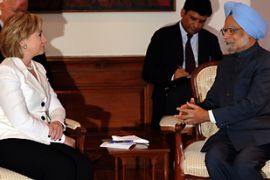India signs arms accord with US
Pact signed during Hillary Clinton’s visit to New Delhi allows sale of US arms to India.

The deal is also designed to ensure that New Delhi is not passing weapons technology from the US on to other nations.
US defence contractors, such as Lockheed Martin Corporation and Boeing Company, are competing to win orders from New Delhi to build 126 fighter aircraft.
Nuclear reactors
Clinton said that India had also approved two sites on its territory for the construction of US nuclear reactors.
|
“You have to be aware that the balance of trade deficit of the United States is $13bn … Obviously, signing a deal of $10bn will go a long way to balance out that trade deficit for the United States” Marie Lall, a specialist in South Asia affairs at Chatham House in London |
“I am also pleased that Prime Minister [Manmohan] Singh told me that sites for two nuclear parks for US companies have been approved by the government,” she said.
US officials estimate that the nuclear sites would represent up to $10bn in business for US nuclear-reactor builders such as General Electric Company and Westinghouse Electric Company, a subsidiary of Japan’s Toshiba Corp.
Marie Lall, a specialist in South Asia affairs at Chatham House in London, said that the deal would go some way to easing the US trade deficit with India.
“You have to be aware that the balance of trade deficit of the United States is $13bn … Obviously, signing a deal of $10bn will go a long way to balance out that trade deficit for the United States,” she told Al Jazeera.
Climate disagreement
Clinton is in India for three days for talks on climate change, security and nuclear power.
But while Washington and New Delhi have reached an agreement on weapons sales, the US government appears to have failed to convince India on the need to reduce its carbon dioxide emissions.
During a meeting with Clinton on Sunday, Jairam Ramesh, India’s junior environment minister, refused to agree to limit the country’s carbon output.
Developing nations should not be forced to sign up to legally binding targets on reducing carbon emissions, Ramesh said.
India is “simply in no position” to cut its levels of harmful emissions, he said.
The refusal comes five months before a UN climate conference in Copenhagen, where it is hoped that more than 190 nations will set targets for emission cuts up to 2020.
Clinton ‘confident’
Despite the differences over the environmental targets, Clinton said she was optimistic that a compromise could be found.
 |
| India says it cannot easily commit to major cuts in carbon emissions [EPA] |
“I am very confident … that the United States and India can devise a plan that will dramatically change the way we produce, consume and conserve energy,” she said.
Bharat Desai, an expert on international environmental law at Delhi’s Jawaharlal Nehru University, told Al Jazeera that developing countries will not [for the time being] take up legally binding commitments.
“But India is taking responsibility, it has various energy efficiency programmes … we have already passed a law on climate change,” he said.
“The developed countries need to take the lead so the developing ones feel comfortable [to follow].”
India is one of several developing nations who argue that their industrial ouput – and hence their economies – will be harmed should they be forced to commit to cuts in carbon emissions.